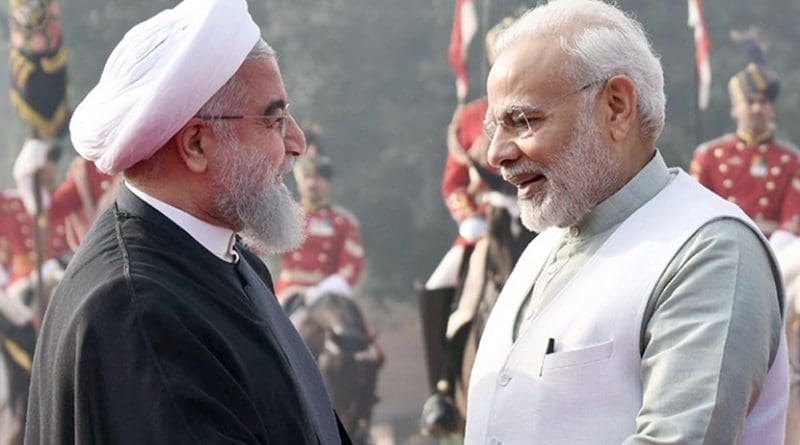US-Iran Crisis: Time For India To Embrace Its Role As The Negotiator? – Analysis
By Observer Research Foundation
By Gautam Chikermane
For several years now, there has been a volcano of national aspirations waiting to breakdown the putrefying system of global governance and erupt out of control. The quest for peace through the creation of the United Nations (UN) is well past its use-by date. Religious violence has replaced nationalistic wars, the battlefield has shifted to shopping malls, streets and borders from strategic assets, citizens have substituted soldiers in death counts, economic violence has superseded physical violence. The power asymmetry in the hands of five nations through the instrument of a Security Council – China, France, Russia, UK and US – has remained the same even though the underlying economics has moved on. The top five economies in 2017 excluded France and Russia; in 2023, UK will join this list, as India climbs up to the No 5 slot, after Japan and Germany. By 2028, India will rise two slots to the No 3 position, according to projections.
Between the threat of US-China trade wars, an Eastward shift of economic growth, and the international system of governance flailing on every count, from politics in the UN and economics through the multilateral agencies like the International Monetary Fund and the World Bank, a pressure has been created in the tectonic plates of international relations. Exhausted by this asymmetry, the world is waking up to its own, looking to spill the lava of injustice and inequality and change the international order. The threat of this volcano erupting grows with every abuse of power, from military expression of China in the South China Sea to economic sanctions by the US on Iran. The UN has become an apology, the Security Council a contradiction, and the rest of the world a simmering cauldron of anger.
Seven decades after the creation of the new world order, led by the UN, the Security Council and its self-serving multilateral institutions, we remain the barbarians we were at the close of World War II. Misguided by big ideas, lulled into a slumber of security, we see that in the 21st century only the texture of barbarity has changed to economics and threats; the underlying fangs of consumption, of beggaring the “other”, the rise of a new unilateralism in the form of the an expanded G2 (US and China) in an increasingly multilateral world, of abusing markets and trade agreements, of starving economies through sanctions or threatening them with war, remain the same.
In its latest move, the US has imposed unilateral economic sanctions on Iran. It has pulled out of the Joint Comprehensive Plan of Action (JCPOA), an agreement signed between China, France, Germany, Russia, UK and US with Iran. The ostensible reason is no longer Iran’s nuclear moves but terrorism,human rights abuses and destabilising activity in the region (most of which fit Iran’s eastern neighbour Pakistan like a glove). China and Russia are already on the other side – China more so because of its oil dependence as the largest export market for Iran’s oil, apart from being a thorn in the US’s economic and power monopoly. As Iran’s second largest export market, India has stated that it believes only in UN-declared sanctions, not those driven by individual nations. Led by Germany and France, the EU is likely to rebel too.
Given the regularity of U-turns in the US’s current administration, this rebellion against the US may be a short-term spike, when US President Donald Trump reverses the sanctions, as he has with North Korea recently. Perhaps, he is testing the last tethers of an ageing global order and retreating with the first stirrings of harmony, using the threats only to deliver a solution that talks often can’t. Countries like India that have decided to weigh in in favour of a globally-ratified sanctions rather than the US-driven ones, cannot take sides. For India, hungry to grow and therefore consume fuels, its energy needs surpass any other reason – Iran is India’s second-largest supplier of oil. Necessary as it may be, this is not a sufficient condition for support. The US remains India’s second-largest trading partner, after China, and one with which India has a favourable balance of trade.
What India is in a good position to do is be the negotiator between the US and Iran. Disruptive and surprising as the idea may sound, this position comes more through a process of elimination than positive choice – Russia is a political untouchable, China an emerging challenger against which trade wars could begin any time now, the EU is on the backfoot through Trump’s threatened withdrawal from the NATO. This leaves India in a somewhat neutral, a somewhat friendly, and a definitely interested party to the crisis. India has the soft goodwill with both nations; what it lacks is the hard power to back any deal. Can Indian Prime Minister Narendra Modi grab this opportunity and run with it? Even if he fails to bring results, it would be a venture worth trying.
In the face of a collapsing and increasingly discredited UN-led old global order, it is opportunities like these that could help bring the much-needed balance to international affairs and through it carve out new paths to a more equal, a more respectful, and a more harmonious future. The journey of nations to growth has so far been transacted through the currency of barbarism. A new currency is now needed, a currency of tranquillity, mutualism, peace, a coinage based on plugging into and benefiting from the larger good. India, that straddles a past brutalised by imperialism and a future that needs economic and political peace to articulate itself in the 21st century as the world’s third-largest economy and an influential power, is best placed to create this currency. Settling the US-Iran crisis would be a good start.
This article originally appeared in ISPI.

